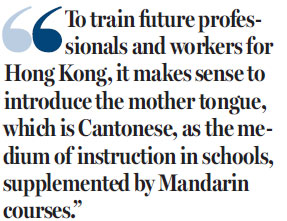Mother tongue teaching is best
Updated: 2016-06-16 08:02
By Peter Liang(HK Edition)
|
|||||||
Peter Liang criticizes HK parents for believing an English education is essential for their children' success, arguing that a good family environment is far more important
In a TV talk show last week, potential candidates for the hotly contested six seats representing Hong Kong Island in the Legislative Council election in September were asked what they considered to be the issue that matters most to voters. Although reluctant to disclose details of their campaign platforms, the candidates of the two major opposing camps agreed that education ranks the highest among the concerns of the majority of voters in that district.
Indeed, to many parents, not only on Hong Kong Island but also around the city, all is not well with the education system in the care of Secretary for Education Eddie Ng Hak-kim. Ng has vigorously defended the government's education policy and complained he was unfairly singled out for criticism.
Nobody would doubt that he is in the hot seat. The problem is more than just a failure of communication. It stems largely from the conflicting demands of the parents, resulting in frustrations that have been politicized by self-serving politicians, educators and social activists.

Hong Kong parents are particularly obsessed with comparing the level of education their children receive with those of other regional economies, especially Singapore and Taiwan. But they also do not want their children to have to study too hard to reach the high standards set by others. This has led to constant bickering on the question of how much time an average child should spend studying to achieve good grades.
Then there is the issue of language. Parents should understand that the education system is not designed to prepare students for emigration. To train future professionals and workers for Hong Kong, it makes sense to introduce the mother tongue, which is Cantonese, as the medium of instruction in schools, supplemented by Mandarin courses.
But many parents in Hong Kong do not see things that way. They branded the "localized" schools that teach in Cantonese as inferior to the English language schools. Those parents who can afford it are sending their children to the international schools, which make a special point of adopting a British or US curriculum.
It is unfortunate that many Hong Kong parents equate an all-English education to giving their children a head start in life. But they will have to ask where this supposed advantage can apply.
Language proficiency does not necessarily give these English-educated Hong Kong students any advantage in other developed economies where they will have to compete for jobs with the many English-speaking young graduates. In the Hong Kong job market, the so-called "head start" that all-English educated students are supposed to enjoy can turn into a distinct disadvantage as the local economy becomes increasingly integrated with the Chinese mainland.
Singapore has made learning Mandarin a priority in school for a good economic reason. In Hong Kong, proposals to introduce Mandarin lessons in local schools were met with a storm of protest from student activists and parent groups.
The opportunity of getting a higher education in Hong Kong has been greatly enhanced in recent years, with nine universities opened to a shrinking student population. There are parents who prefer to send their children to study at overseas universities. But that is a matter of choice rather than necessity. To be sure, overseas education can help broaden the mind of the student. Other than that, it is hard to tell what additional advantage he, or she, can get in competing for jobs in Hong Kong.
Many educators have complained about the falling standards of English in Hong Kong in recent years. Parents were quick to pick that up as an additional reason to criticize the education system.
That is not fair. They should rather blame themselves and their children for being too lazy to study the language which can only be mastered by reading and practicing over a long period of time. Schools can only teach basic grammar. Correct usage can only be acquired by extensive reading, not only of textbooks to pass exams, but also novels and other works of literature.
Instead of indulging in the blame game, parents should spend more time and effort in providing their children with a suitable family environment to excel in life.
The author is a veteran current affairs commentator.
(HK Edition 06/16/2016 page1)